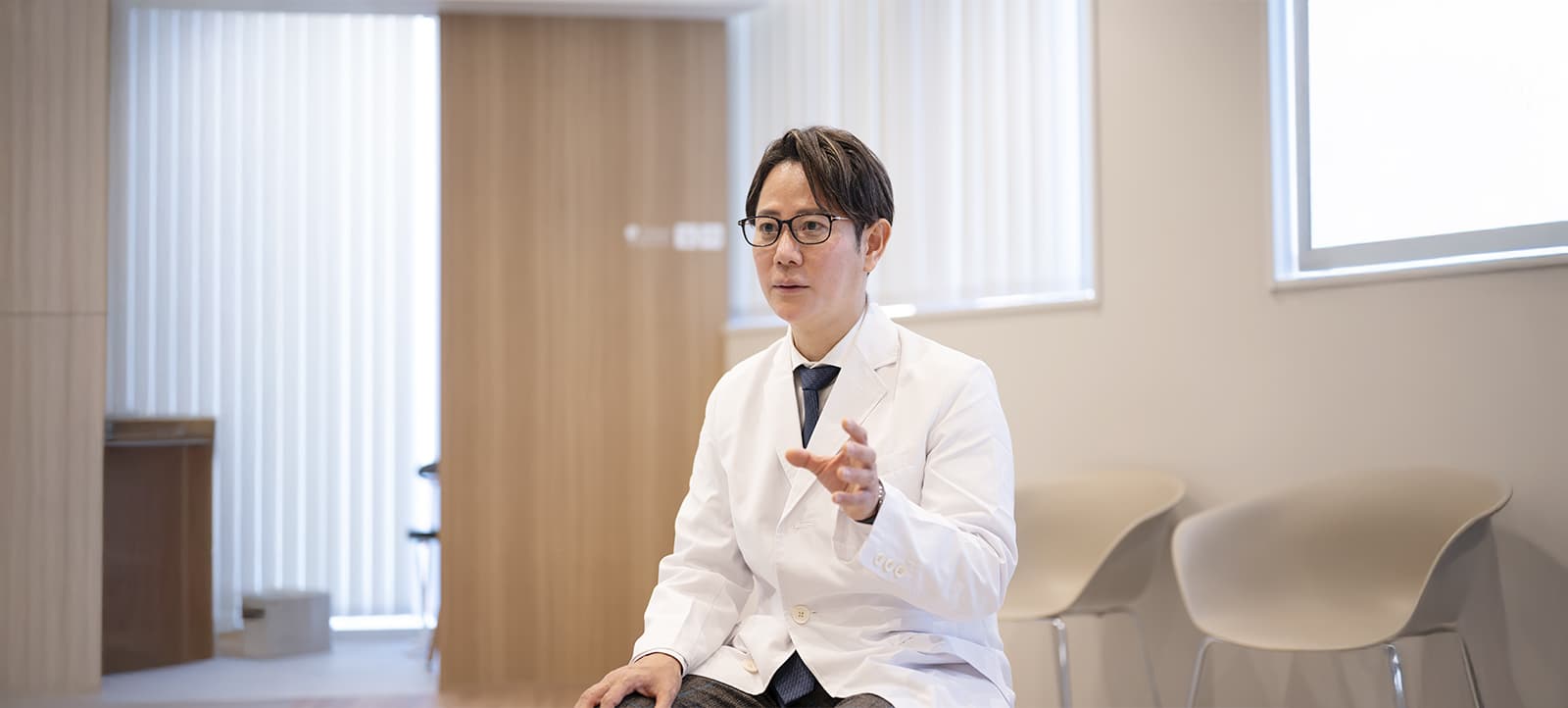My History
Dr. Hanafusa established Hanafusa Dermatology Clinic in 2011, driven by a deep-seated desire to provide more personalized, patient-centered care. At the time, he was affiliated with the University of Tokyo’s Department of Dermatology, rotating through various hospitals. But the constant movement left her yearning for a place where he could build lasting relationships with her patients. That opportunity came when a clinic in Mitaka was seeking a successor. Recognizing the potential to realize her vision, he took the leap and opened her own practice.
From day one, Dr. Hanafusa has prioritized meaningful, one-on-one interaction with each patient. he believes that maximizing patient outcomes often requires more than just prescribing medication—it demands a comprehensive understanding of lifestyle habits as well. For example, in treating atopic dermatitis, detailed guidance on how to apply ointments and manage daily routines can significantly improve symptoms. His approach is grounded in long-term health, and in the realm of aesthetic dermatology, he emphasizes restraint—never recommending unnecessary procedures.
Initially focused on general dermatology, the clinic has since evolved to meet the growing and diverse needs of its patients. This expansion now includes aesthetic dermatology and dermatologic surgery. Particularly challenging conditions like acne scars, enlarged pores, and rosacea—issues that often resist conventional treatment—have driven Dr. Hanafusa to explore global literature and attend conferences in search of better solutions. Through rigorous research and clinical innovation, he developed the proprietary “Hanafusa Method,” a unique and effective treatment protocol for acne scarring.
The Present
While the proprietary “Hanafusa Method” initially faced skepticism from peers, the overwhelmingly positive feedback from patients validated its effectiveness. Encouraged by these results—and driven by a desire not only to innovate but also to uplift the industry as a whole—Dr. Hanafusa began expanding he practice. By April 2025, the Hanafusa Group is projected to operate 17 clinics across Japan.
This growth, however, is far from a simple expansion in numbers. The focus has been on ensuring consistent, high-quality care at every location. To achieve this, the group has implemented rigorous training programs and standardized treatment protocols, allowing patients at each clinic to benefit from the same level of expertise and care that defined the original practice.
Dr. Hanafusa also emphasizes that innovation in medicine must go hand in hand with safety. Every treatment offered is rooted in solid medical evidence, and patient trust is earned through transparency and integrity. To uphold these values at scale, he has cultivated a workplace where doctors and staff collaborate closely, supported by a system that empowers them to grow professionally and pursue meaningful careers.
Creating an environment in which individuals can thrive requires an organization that is itself committed to continuous evolution. The rapid growth and multi-clinic expansion over the past decade reflect not only clinical success but also a deliberate strategy to foster a culture of excellence, learning, and leadership across the entire group.
For the Future
In recent years, the aesthetic medicine industry has faced growing skepticism—a trend that, in Dr. Hanafusa’s view, stems largely from its drift away from scientific principles. Despite holding medical licenses, some practitioners have resorted to exaggerated, unscientific claims in their advertising. Others, conversely, dismiss evidence-based treatments on social media with unfounded certainty. This “whoever shouts loudest wins” mentality is eroding public trust and compromising patient care.
Dr. Hanafusa remains steadfast in he belief: aesthetic medicine is, at its core, still medicine. As such, it should be governed by the same standards of scientific rigor and ethical responsibility. he is committed to disseminating accurate, medically grounded information, and hopes his efforts will contribute to cleaning up the industry's image.
To truly address these systemic challenges, he advocates for broader reforms. These include establishing independent third-party bodies to assess the appropriateness of treatments and instituting reasonable regulations on social media accounts that spread medical misinformation. The goal is to strike a balance—preserving physicians’ creative freedom while protecting patients from harm through responsible governance.
Looking ahead, Dr. Hanafusa’s next ambitious goal is to develop a method for fully erasing scars—an area where current medical consensus still maintains, “Scars cannot be completely healed.” His vision is to overturn this belief through continued research and innovation, creating a future in which even the most persistent skin concerns can be resolved comprehensively and compassionately.
